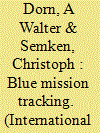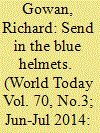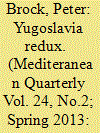| Srl | Item |
| 1 |
ID:
142278


|
|
|
|
|
| Summary/Abstract |
A basic but as yet unachieved goal for UN missions is to know the exact locations of their peacekeepers at any given time. Such tracking would help field missions plan operations, avoid and respond to ambushes, kidnappings and friendly fire incidents, rapidly send reinforcements and retrieve wounded peacekeepers, ultimately saving lives. Improved effectiveness could be obtained from ‘precision peacekeeping’, where soldiers, police and civilians are deployed to precise locations and events, while operational leaders follow their movements. Fortunately, tracking technology has improved considerably so that commercial solutions for real-time tracking of personnel and vehicles are now available at lower cost and increased accuracy and sophistication, while being more user-friendly. The advances in phone and vehicle tracking systems are reviewed here to identify the benefits, drawbacks and challenges, especially any political ones, for the United Nations. The world organization can benefit from modern blue mission tracking, without having to develop costly, customized solutions. Such initiatives have few technological or financial hurdles but the politics and institutionalization of continuous positional surveillance needs policy modernization, guided by a nuanced understanding of technological empowerment.
|
|
|
|
|
|
|
|
|
|
|
|
|
|
|
|
| 2 |
ID:
106775


|
|
|
|
|
| Publication |
2011.
|
| Summary/Abstract |
This article examines how operationalizing the 'responsibility to protect' (R2P) concept may assist in defining the scope of civilian protection mandates for peacekeepers, which are ambiguously restricted by three caveats - 'imminent threat of physical violence', 'area of deployment' and 'capabilities'. It is argued that by restrictively interpreting civilian protection mandates in the light of R2P the limited resources of peacekeeping troops would be more effectively utilized to protect civilians from mass atrocity crimes. Greater investment would be required to build capacity among the more creative and specially trained units to protect civilians from physical violence, in addition to greater coordination between the military and those specially trained units.
|
|
|
|
|
|
|
|
|
|
|
|
|
|
|
|
| 3 |
ID:
131286


|
|
|
| 4 |
ID:
095237


|
|
|
|
|
| Publication |
2010.
|
| Summary/Abstract |
This article reconceptualizes the idea of the impartiality of UN peacekeeping in light of allegations of sexual exploitation and abuse by peacekeeping personnel. It considers the role that sexual exploitation and abuse play both during and after conflict. The paper argues that sexual exploitation and abuse are political acts that bring about financial and propagandist benefits for the warring parties. It then tracks the history of neutrality in UN peacekeeping - originally defined as objective inaction against the warring parties - and its development into impartiality - now identified as unbiased interference, but with greater reference to core universal values such as fairness and justice. Peacekeepers' involvement in sexual exploitation and abuse is of political advantage to the parties and therefore breaches the principle of impartiality.
|
|
|
|
|
|
|
|
|
|
|
|
|
|
|
|
| 5 |
ID:
095235


|
|
|
|
|
| Publication |
2010.
|
| Summary/Abstract |
The UN's commitment to zero tolerance for sexual exploitation and abuse, which has been strengthened ever since the Secretary-General's 2003 'Bulletin', must be understood against the general public's non-tolerance of sexual misconduct by peacekeepers. While the UN has devoted its energy to restoring the public's confidence, the implementation of the policy cannot be effective, due to the limits of the UN's command authority, without the adoption of the same policy in contingent-contributing countries, who assume even greater roles under the revised model memorandum of understanding in 2007. Furthermore, not all victims approve the UN's zero tolerance pledge, out of fear that they may lose their only recourse to making a living. While it will likely take time to alleviate existing obstacles to align all the actors involved, the general public may not be tolerant enough to allow a further moratorium.
|
|
|
|
|
|
|
|
|
|
|
|
|
|
|
|
| 6 |
ID:
120904


|
|
|
|
|
| Publication |
2013.
|
| Summary/Abstract |
Despite the dreadful wars-and the comparable horrors of uncertain "peace"-and against the background of an almost religious knack for recurring Balkan catastrophe, there are warnings that hostilities are reviving in the former Yugoslav republics of Serbia, Croatia, and Bosnia and their substates. Kosovo has redeclared its "independence" for the second time in four years. Ethnic Hungarians are stretching their "autonomy" and prodding for secession in Vojvodina-or will it be "Vojvodinia?"-as former UN peacekeepers (among others) deal with cancer caused by depleted uranium in the former killing fields. Inner migration of hundreds of thousands of displaced persons temporarily plugged holes in Serbia's negative population growth in the midst of a continuous exodus to Europe and anywhere else. Numerous signs point to the potential for renewed and ongoing difficulties in this most difficult of regions. This essay provides an overview of the gathering clouds.
|
|
|
|
|
|
|
|
|
|
|
|
|
|
|
|